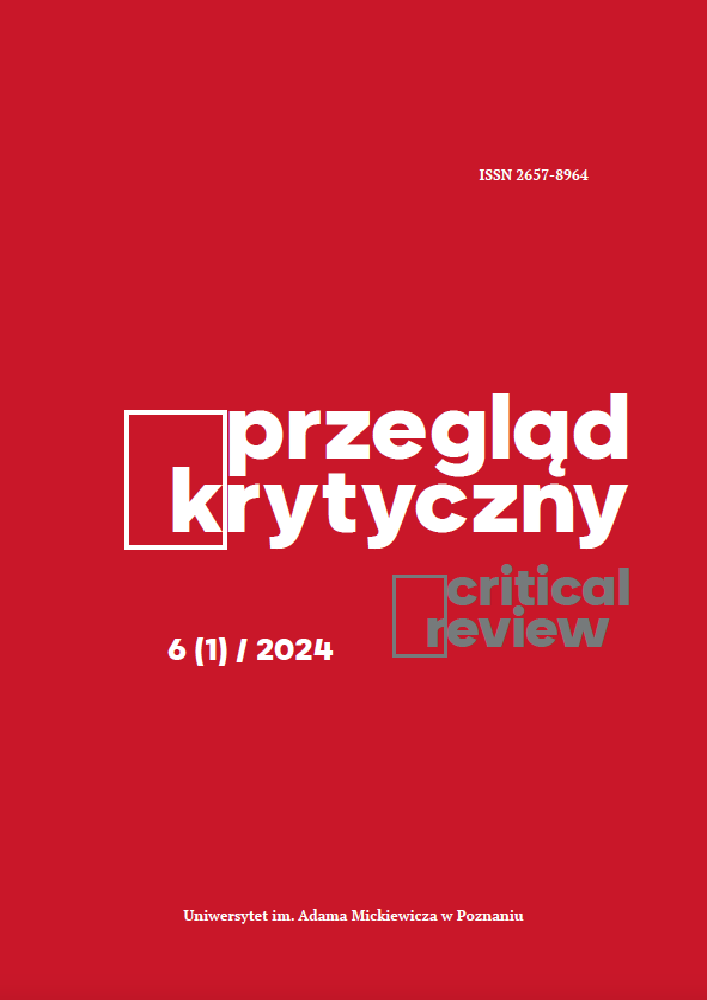Abstract
The purpose of this article is to analyze the mental state of war refugees who have come to Poland since the beginning of the Russian-Ukrainian war in 2022 from the perspective of a crisis psychologist who implements psychological support directed to refugees in Poland. The predominant group of those fleeing the war are women with children, nevertheless there are also men among those forced to emigrate by the war. Ukrainian women found themselves in a completely new environment, in an unfamiliar country, but they did not lose their strength to cope with daily challenges and maintain a standard of living that met their current needs. However, in the group of female war migrants, there are also those who did not cope with the crisis and continue to feel the destructive impact of the traumatic experience on their own mental and physical health and thus on the health of their children. The article focuses on an analysis of the factors that inhibit and promote the maintenance of mental health by war refugees in their new place of residence.
References
Andersen, J. & Silver, R. (2020). Health Effects of Traumatic Events. W: K. Sweeny, M. L. Robbins, L. M. Cohen (red.). The Wiley Encyclopedia of Health Psychology. Online Wiley Library. DOI: https://doi.org/10.1002/9781119057840.ch74
Bryant, R., Nickerson, A., Morina, N., & Liddell, B. (2023). Posttraumatic Stress Disorder in Refugees. Annual Review of Clinical Psychology, 19, 413-436. DOI: https://doi.org/10.1146/annurev-clinpsy-080921-080359
Carlson, E. & Dalenberg, C. (2000). A conceptual framework for the impact of traumatic experiences. Trauma, violence, & abuse, 1(1), 4-28. DOI: https://doi.org/10.1177/1524838000001001002
Digidiki, V., Bhabha, J., Markowska-Manista, U., & Dobkowska, J. (2024). Building Inclusion, Sustaining Solidarity towards migrants in frontline local communities: The case of Poland during the Ukrainian Refugee Crisis. Harvard FXB Center for Health and Human Rights, Boston, USA. https://fxb.harvard.edu/wp-content/uploads/sites/2464/2024/01/Poland-Building-Inclusion-Sustaining-Solidarity-Report.pdf
Długosz, P. (2022). Trauma wojenna ukraińskich uchodźców przebywających w Polsce. Uchodźstwo, trauma, współpraca. Studia Polityczne, 4, 15-44. DOI: https://doi.org/10.35757/STP.2022.50.4.05
Duszczyk, M. & Karczmarczyk, P. (2022). War and migration: the recent influx from Ukraine into Poland and possible scenarios for the future. CMR Spotlight, Warsaw. https://www.migracje.uw.edu.pl/wp-content/uploads/2022/04/Spotlight-APRIL-2022.pdf
Fiddian-Qasmiyeh, E., Loescher, G., Long, K., & Sigona, N. (2014). Refugee and forced migration studies. Oxford: Oxford University Press. DOI: https://doi.org/10.1093/oxfordhb/9780199652433.013.0010
Froid, Z. (1998). Vstup do psykhoanalizu. Kyiv. Vydavnytstvo: Osnovy.
Isański, J., Nowak, M., Michalski, M. A., Sereda, V., Vakhitova, H., Dembek, K., Herasym, H., Kamiński, D., Kozak, J., & Sternalska, A. (2022). Social reception and Inclusion of refugees from Ukraine. UKREF Research Report. DOI: https://doi.org/10.21203/rs.3.rs-1694920/v1
Januszewska, E. & Markowska-Manista, U. (2017). Dziecko ‘inne’ kulturowo w Polsce: z badań nad edukacją szkolną. Warszawa: Wydawnictwo Akademii Pedagogiki Specjalnej.
Januszewska, E. & Markowska-Manista, U. (2022). Working with children with migrant experience-a case study of the organization Stadtpiraten Freiburg eV in Freiburg im Breisgau, Germany. Studia z Teorii Wychowania, 41(4), 275-290. DOI: https://doi.org/10.5604/01.3001.0016.1647
Kalejdoskop Kultur (2023). Laboratorium Asystentów Międzykulturowych. https://kalejdoskopkultur.pl/?page_id=5665
Kostiuk, D. & Kostiuk, V. (2019). Psykhichne ta psykholohichne zdorovia osobystosti: poniattia, zmist ta kryterii. Visnyk Natsionalnoho universytetu oborony Ukrainy, 50(2), 45-50.
Lahad, M. (2017). From victim to victor: The development of the BASIC PH model of coping and resiliency. Traumatology, 23(1), 27-34. DOI: https://doi.org/10.1037/trm0000105
Latenko, S. & Khimich, I. (2023). Medyko-biolohichni aspekty zberezhennia psykhichnoho zdorovia suchasnoi molodi v umovakh viiskovoi ahresii. Naukovyi chasopys NPU imeni M. P. Drahomanova, 3K (162), 221-225. DOI: https://doi.org/10.31392/NPU-nc.series15.2023.3K(162).45
Lebedynska, I. (2012). Identychnist i kultura. Dosvid psykholohichnoi interpretatsii. Kyiv. Vydavnytstvo: Zoloti vorota.
Markowska-Manista, U. & Ovcharenko, O. (2024). „W mojej głowie wojna — interwencje kryzysowe w zakresie wsparcia psychologicznego kierowane do dzieci z doświadczeniem migracji z Ukrainy, w sytuacji zagrożenia. Dziecko Krzywdzone. Teoria, Badania, Praktyka, 23(2), 108–147.
Międzynarodowa Statystyczna Klasyfikacja Chorób i Problemów Zdrowotnych, X Rewizja, Tom I, wydanie 2008. Centrum Systemów Informacyjnych Ochrony Zdrowia.
Miuller, M. (2014). Yakshcho vy perezhyly psykhotravmuiuchu podiiu. Lviv. Vydavnytstvo Ukrainskoho katolytskoho universytetu.
Muldoon, O., Haslam, S., Haslam, C., Cruwys, T., Kearns, M., & Jetten, J. (2019). The social psychology of responses to trauma: social identity pathways associated with divergent traumatic responses. European Review of Social Psychology, 30(1), 311-348. DOI: https://doi.org/10.1080/10463283.2020.1711628
Olejniczak, K. (2023). Zbudowali życie od zera. Uchodźcy z Ukrainy po roku w Polsce. Polityka i społeczeństwo. PORTALSAMORZĄDOWY.PL. https://www.portalsamorzadowy.pl/polityka-i-spoleczenstwo/zbudowali-zycie-od-zera-uchodzcy-z-ukrainy-po-roku-w-polsce,441851.html
Pedorenko, V. (2022). Osoblyvosti psykhoemotsiinoho stanu pereselentsiv v umovakh inshoi krainy (na prykladi Nimechchyny). Naukovyi visnyk Uzhhorodskoho natsionalnoho universytetu: Psykholohiia, 5, 5-10.
Rybyk, L. (2018). Psykholohichna dopomoha pid chas perezhyvannia vtraty – chy mozhemo my dopomohty liudiam perezhyty hore? Psychological Journal: Scientific Review, 20, 61-77. DOI: https://doi.org/10.31108/1.2018.10.20.4
Schlechter, P., Rodriguez, I., Morina, N., Knausenberger, J., Wilkinson, P., & Hellmann, J. (2021). Psychological distress in refugees: The role of traumatic events, resilience, social support, and support by religious faith. Psychiatry Research, 304, 114-121. DOI: https://doi.org/10.1016/j.psychres.2021.114121
Sherin, J. & Nemeroff, C. (2011). Post-traumatic stress disorder: the neurobiological impact of psychological trauma. Dialogues in Clinical Neuroscience, 13(3), 263-278. DOI: https://doi.org/10.31887/DCNS.2011.13.2/jsherin
Sliusarevskyi, M., Blynova, O. (2013). Psykholohiia mihratsii: navchalnyi posibnyk. Kyiv. Vydavnytstvo: Natsionalna akademiia pedahohichnykh nauk Ukrainy. Instytut sotsialnoi ta politychnoi psykholohii.
Zepinic, V. (2022). Separation Fear: An Integral Feature of the Complex Trauma Syndrome in War-Refugees. International Journal of Psychological Studies, 14(1), 48-59. DOI: https://doi.org/10.5539/ijps.v14n1p48
Zlyvkov, V., Lukomska, S. (2023). Sotsialna ta osobystisna militarna identychnist ukraintsiv v umovakh viiny. Pedahohichna ta vikova psykholohiia, 3, 28-34.
License
Copyright (c) 2024 Olha Ovcharenko

This work is licensed under a Creative Commons Attribution-NonCommercial 4.0 International License.
W przypadku zakwalifikowania tekstu do druku Autor wyraża zgodę na przekazanie praw autorskich do tego artykułu wydawcy (zob. Polityka open access). Autor artykułu zachowuje prawo wykorzystania treści opublikowanego przez czasopismo artykułu w dalszej pracy naukowej i popularyzatorskiej pod warunkiem wskazania źródła publikacji.


